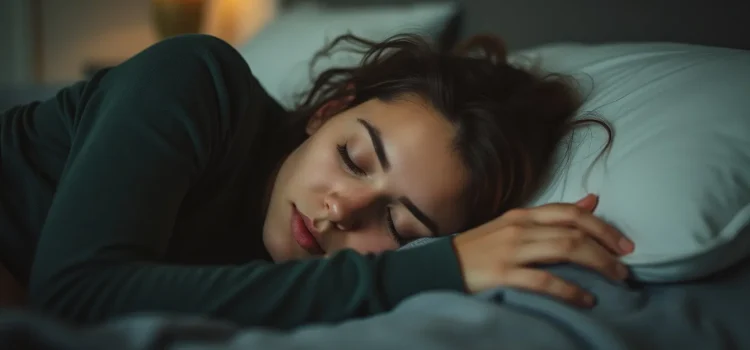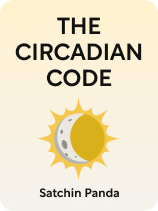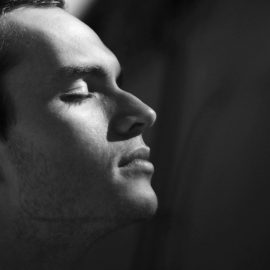

This article is an excerpt from the Shortform book guide to "The Circadian Code" by Satchin Panda. Shortform has the world's best summaries and analyses of books you should be reading.
Like this article? Sign up for a free trial here.
How often do you get a good night’s sleep? Do you wake up feeling groggy and unrested, even after spending hours in bed?
If you struggle with a disrupted circadian rhythm, sleep might be the issue. In The Circadian Code Satchin Panda writes that we can make simple changes to improve our sleep quality and feel more energized throughout the day by understanding how our body’s natural sleep-wake cycle works.
Keep reading to explore how you can sync your sleep habits with your body’s natural rhythms.
Circadian Rhythm & Sleep
Panda writes that, if you want to get in sync with your circadian rhythm, sleep must be prioritized in your lifestyle. Your body prepares for the next day during sleep, so the quality of your sleep affects how well you function and feel the next day.
When you don’t get enough rest, your mood and performance suffer. You might make poor decisions, forget things, fall into bad habits, and eat more poorly. Panda suggests that sleep issues can also contribute to health problems like stomach issues, weight gain, diabetes, and heart disease. If you feel sleepy during the day and don’t wake up feeling refreshed, your sleep habits are probably out of sync with your circadian rhythm.
(Shortform note: Because sleep deprivation affects health and performance, it has a huge impact on the economy. One study found that sleep deprivation costs the US economy up to $411 billion annually (equivalent to 2.28% of the country’s GDP) due to lost productivity. Additionally, sleep deprivation not only leads to the health issues that Panda describes—the study shows that people who sleep less than six hours a night have a 13% higher risk of mortality compared to those who sleep seven to nine hours.)
Panda explains that high-quality sleep acts as a cleaning process for your brain, removing waste and toxins that could impair your brain function. Consistent sleep patterns that follow your natural circadian rhythm help this cleaning process work efficiently.
(Shortform note: In Sleep Smarter, Shawn Stevenson adds that the brain’s waste removal system is 10 times more active when you’re asleep than when you’re awake. During sleep, your brain cells shrink by about 60%, which allows the clean-up process to work more efficiently. If you don’t get quality sleep, the waste products stay in your brain and can lead to cognitive diseases like Alzheimer’s.)
Panda recommends three sleep habits to sync with your circadian rhythm: going to bed early, having a regular sleep schedule, and creating a good sleep environment.
Habit #1: Go to Bed Early
First, Panda recommends you go to bed early so that you get the amount of sleep you need—at least seven hours a night for adults. Going to bed at a late hour makes it difficult for you to get this recommended amount of sleep. Now, this advice might seem challenging for people who consider themselves “night owls.” However, Panda argues that the idea that some people are naturally night owls and others are early birds based on genetics is a myth. Rather, people who consider themselves night owls simply have habits that keep them awake longer—such as snacking, consuming caffeine late, or using bright lights in the evening.
(Shortform note: In Why We Sleep, Walker agrees that you should get at least seven hours of sleep, adding that only 1% of the population can get only six hours of sleep without showing any impairment. However, he disagrees with the idea that being a night owl is simply due to poor sleep habits. He argues that chronotypes—whether you’re a “morning person” or “night owl”—are real and are genetically determined. He explains that humans likely evolved to have different chronotypes to reduce the vulnerability of the population, with night owls watching out for threats in the evening and morning people keeping a lookout in the morning.)
In addition to giving your body adequate time to rest and repair, sleeping early has another benefit: It helps curb late-night snacking. Panda writes that hunger—especially for unhealthy, high-calorie foods—increases when you stay up late. When your body isn’t sure how long it’ll stay awake, it “thinks” it needs more energy to support your activities and produces more of the hormone that makes you feel hungry (ghrelin) and less of the hormone that makes you feel full (leptin). This is why you crave midnight snacks, even when your body doesn’t need to eat.
| Why You Crave Junk Food at Night Research supports the idea that you crave unhealthier foods at night. Specifically, your preference for fatty, sugary, and salty foods peaks around midnight and stays high for a few hours afterward. But why do you reach for a bag of chips and not a cup of yogurt to satisfy your late-night cravings? There are two main reasons. First, your body’s hormone levels change throughout the day, affecting not only your hunger but also your food preferences. As night approaches, your cortisol levels naturally drop, signaling your body that it’s time to sleep. Cortisol is a hormone that tells your liver to release sugar into your blood. If you stay awake when cortisol is low, your body experiences a drop in blood sugar. To make up for this, your body makes you crave high-calorie foods to give you energy. Second, feeling tired at the end of the day can also increase your desire for unhealthy foods. Studies show that when you stay awake late into the night and your body produces ghrelin as Panda mentions, your brain’s reward centers respond more strongly to junk food than to healthy food. This makes it harder for you to make good decisions about what to eat. So while those midnight fast food runs may feel satisfying in the moment, they’re really just your body’s way of saying it needs rest. |
Habit #2: Have a Regular Sleep Schedule
A second habit Panda recommends you adopt for quality sleep is keeping a consistent sleep schedule. When your sleep schedule is consistent, your body learns when to produce the sleep hormone melatonin, making it easier to fall asleep and wake up naturally.
(Shortform note: A consistent sleep schedule may be even more important for teenagers. During adolescence, the body starts producing melatonin about three hours later in the 24-hour sleep cycle compared to children or adults. This shift means teenagers naturally feel sleepy later at night and have a harder time waking up early in the morning, which explains why many teens struggle with early school start times. So, by setting a consistent sleep schedule, teenagers may find it easier to go to bed earlier and wake up in time for school.)
To keep a regular sleep schedule, go to bed and wake up at the same time each day, including on weekends. Changing your sleep schedule on the weekends throws off your circadian rhythm, which can lead to poor sleep quality, daytime fatigue, and mood changes. Panda adds that if you’re sleeping in much later on the weekends, chances are you’re probably not getting enough sleep during the week.
(Shortform note: Many experts agree with Panda on the importance of maintaining a regular sleep schedule, explaining that shifting your sleep schedule significantly on the weekends can have a similar effect on your body as flying across time zones every weekend. Ideally, aim to get sufficient sleep on a consistent schedule as much as possible. However, if you’re sleep-deprived, some experts argue that your priority should be increasing your total sleep time, even if it means varying your schedule. In these cases, catching up on sleep during weekends can be beneficial. However, it’s still best to work toward a consistent sleep schedule in the long run.)
Habit #3: Create a Good Sleep Environment
Panda recommends you create a cool, dark, and quiet sleep environment to fall asleep more easily and stay asleep throughout the night. Your body temperature should decrease about one degree Fahrenheit to get the best sleep. This is also why you should avoid eating before you sleep: If you eat too close to bedtime, your body temperature will rise and keep you from reaching deep sleep. Finish eating two to four hours before you sleep to give your body time to cool off.
(Shortform note: Your body temperature rises when you eat because your metabolism generates heat as it breaks down food. Spicy, sugary, and fatty foods can have a bigger effect on your body temperature. Spicy foods contain compounds that trick your body into thinking it’s hot, while sugary and fatty foods require more energy to digest, generating more heat in the process. By allowing a few hours between your last meal and bedtime, you give your body time to complete much of the digestion process and allow your temperature to naturally decrease.)
Panda also suggests it’s best to sleep in a dark room because any light, particularly blue light (from electronic devices and home lighting), can confuse your brain into thinking it’s still daytime. You can further improve your sleep quality by using white noise or fixing problems such as snoring or sleep apnea.
(Shortform note: In Why We Sleep, Walker provides more specific tips that can help you create the ideal sleep environment that Panda recommends. First, he recommends you lower your bedroom temperature to 65° F for the best sleep. If you’re struggling to stay cool, consider splashing water on your skin or sticking your hands and feet outside your blanket. Walker also recommends you create a dark room, arguing that even a bedside lamp can prevent you from feeling sleepy. He suggests dimming lights in rooms where you spend your evenings and using blackout curtains to maintain complete darkness throughout the night.)
If you still struggle to fall asleep after trying these strategies, Panda recommends trying natural supplements like melatonin before turning to sleep medications. He writes that sleep medications haven’t been thoroughly examined for use beyond six months and aren’t intended to be a long-term solution.
| Alternative Tips & Methods for Falling Asleep Like Panda, Walker also advises, in Why We Sleep, against using sleep medications, writing that they can create a vicious cycle of dependence that’s hard to break. Sleeping pills don’t induce natural, restorative sleep because they put you into a state that lacks the deepest brain waves, leading to daytime drowsiness. This daytime drowsiness leads you to use more caffeine and take naps, which then makes it harder to sleep at night without pills. As your body builds a tolerance, you need higher doses, which increases the risks of negative side effects like car accidents, infections, and possibly even cancer. Over time, you may develop a tolerance to the pills, and stopping them can lead to withdrawal insomnia, further perpetuating the cycle. Instead of turning to medication, Walker suggests you consider cognitive behavioral therapy for insomnia (CBT-I). For this type of therapy, you’ll work with a therapist to change your thoughts and behaviors about sleep. Therapy can include practices like restricting how much time you spend in bed to build up your desire to sleep, removing clocks from your bedroom to reduce anxiety, and only going to bed when you’re truly sleepy. Walker says that CBT-I has been shown to be more effective in the long run than sleeping pills. It helps you rebuild confidence in your ability to sleep naturally by addressing both the psychological and behavioral aspects of insomnia. Although melatonin supplements are an option, in Sleep Smarter, Shawn Stevenson says you can fall asleep easier by going to bed before 10:00 PM, which is when your body produces the most melatonin. If you’re awake after 10:00 PM, you’ll get a burst of energy that makes it harder to sleep. While Stevenson doesn’t explicitly mention melatonin supplements, he does offer other diet and herbal supplement suggestions that can help you fall asleep easier. He suggests you get enough tryptophan, vitamin C, and omega-3s in your diet, as these three nutrients promote deeper, more restful sleep. You can also consider taking kava kava, chamomile, or valerian if you need extra help falling asleep at night. |
Exercise
Describe your sleep routine. What time do you usually go to bed and wake up? Are these times consistent, even on weekends?

———End of Preview———
Like what you just read? Read the rest of the world's best book summary and analysis of Satchin Panda's "The Circadian Code" at Shortform.
Here's what you'll find in our full The Circadian Code summary:
- The modern habits that disrupt your circadian rhythm
- How your internal 24-hour schedule works
- The little habits that will recharge your battery






